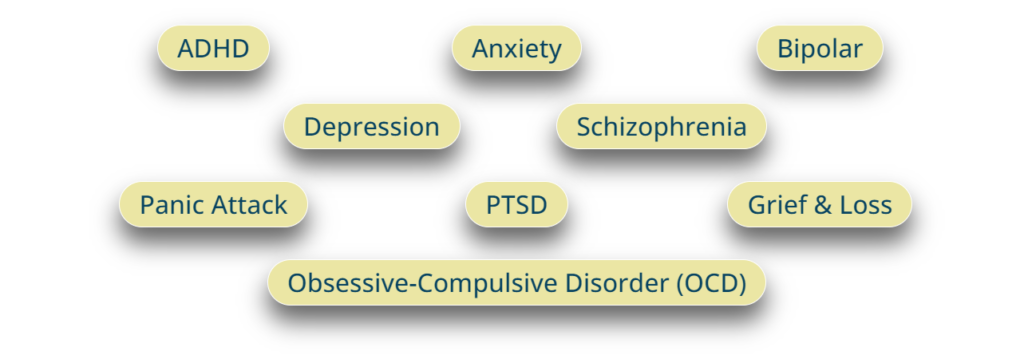The Most Common Mental Health Disorders Treated By Psychiatrists

Mental health disorders have a huge impact on a person’s life. Mental health disorders affect their behaviors, thoughts, & emotions. Psychiatrists specialize in mental health disorders’ diagnosis, treatment, & management. Psychiatrists portrait a vital role in helping people overcome their challenges & enhance their overall well-being. Nonetheless, we’ll explore the most common mental health disorders treated by psychiatrists. Thus, we gain a better understanding of mental health disorders’ impact on individuals.
Depression
Depression is among the most widespread mental health disorders around the world. It affects millions of individuals. It is characterized by persistent feelings of sadness & hopelessness. It’s also a loss of interest or pleasure in activities. People with depression also experience sleep disturbances, appetite changes, low energy levels, & difficulty concentrating. Additionally, it leads to thoughts of suicide.
Psychiatrists play an important role in depression & diagnosis & treatment. They employ several therapeutic approaches. This includes medication management & psychotherapy. These therapeutic approaches help individuals manage their symptoms effectively. Cognitive-behavioral therapy is commonly utilized to challenge negative thought patterns & develop healthier coping mechanisms. Psychiatrists will prescribe antidepressant medications to alleviate symptoms & restore the brain’s chemical imbalances. Individuals with depression can find relief with the help of psychiatrists.
Anxiety Disorders
Anxiety disorders encompass various conditions characterized by excessive & persistent worry. Typical anxiety disorders are panic disorder, generalized anxiety disorder, specific phobias & social anxiety disorder. People with anxiety disorders experience symptoms like irritability, restlessness, difficulty concentrating, racing thoughts, physical manifestations, & sleep disturbances.
Psychiatrists portrait an essential role in diagnosing & treating anxiety disorders. They use several therapeutic techniques like cognitive-behavioral therapy & exposure therapy. These techniques help individuals manage their anxiety. CBT helps individuals identify & challenge negative thought patterns, while exposure therapy gradually exposes them to feared situations to reduce their anxiety response. Psychiatrists will prescribe medications to help manage symptoms.
Bipolar Disorder
Bipolar disorder is a mental health disorder characterized by utmost mood swings. Individuals with bipolar disorder undergo periods of elevated mood. People with bipolar disorder have high energy levels, feel euphoric, engage in risky behavior, & experience a reduced need for sleep.
Psychiatrists portray an important role in managing bipolar disorder. They collaborate with individuals to develop customized treatment plans. This includes antipsychotic medications, antidepressants, & mood stabilizers. Psychotherapy also helps individuals understand their condition. They will be able to manage symptoms & maintain stability in their lives. Individuals with bipolar disorder can lead fulfilling lives with ongoing treatment from psychiatrists.
Schizophrenia
Schizophrenia is a chronic & severe mental health disorder. It affects how a person behaves, thinks, & feels. It is distinguished by symptoms like delusions, hallucinations, disorganized thinking, as well as a lack of motivation & emotional expression. Individuals with schizophrenia go through an important impact on their daily functioning & relationships.
Psychiatrists portray an important role in schizophrenia treatment. They collaborate with patients to develop treatment plans. The treatment plans involve a combination of therapy, antipsychotic medications, & psychosocial interventions. Antipsychotic medications manage the symptoms of psychosis. It reduces the intensity of hallucinations. Psychosocial interventions aim to improve overall functioning. It also promotes independence. Therapy helps individuals cope with the challenges of the disorder. Also, it enhances support within the family.
ADHD
ADHD is a neurodevelopmental disorder that typically begins in childhood & frequently continues into adulthood. It is characterized by persistent patterns of impulsivity, inattention, & hyperactivity. Individuals with ADHD struggle with controlling impulsive behaviors, staying focused, organizing activities, & more. ADHD affects individuals’ work productivity, academic performance, & relationships.
Empire Psychiatry’s psychiatrists are essential in diagnosing & treating ADHD. They utilize several approaches. This includes behavioral therapy, medication management, & psychoeducation. Behavioral therapy & parent training helps individuals develop coping strategies. It improves executive functioning skills. Psychiatrists typically prescribe stimulant medications to enhance attention. Stimulant medications also reduce hyperactivity. Psychiatrists also use non-stimulant medications as an alternative or in combination with stimulants.
Obsessive-Compulsive Disorder (OCD)
Obsessive-Compulsive Disorder is a chronic mental health condition characterized by distressing thoughts. Distressing thoughts are known as obsessions. These distressing thoughts are followed by repetitive behaviors & mental acts. Individuals with OCD frequently go through a sense of intense anxiety if they do not perform these rituals. Common obsessions include concerns about cleanliness, symmetry, or harm, while compulsions may involve repetitive handwashing, checking, or counting.
Psychiatrists are huge factors in the treatment of OCD. They use evidence-based therapies like cognitive-behavioral therapy – particularly Exposure & Response Prevention. Exposure & Response Prevention aims to gradually expose individuals to situations that trigger their obsessions. This prevents them from engaging in compulsive behaviors. Thus, helping them develop healthier coping mechanisms as well as reduce anxiety. Nonetheless, psychiatrists prescribe medications to alleviate symptoms & manage the underlying chemical imbalances associated with OCD.
Final Thoughts
Psychiatrists are essential in the diagnosis, treatment, & management of numerous mental health disorders. Whether it’s anxiety disorders, schizophrenia, or numerous other conditions – psychiatrists portray an important role in providing comprehensive care to individuals experiencing these challenges.
Empire Psychiatry’s psychiatrists help individuals find relief from their symptoms through a combination of therapies. People with mental disorders will improve their overall functioning & regain control of their lives. The expertise of psychiatrists contributes significantly to the mental health of countless individuals around the world.

